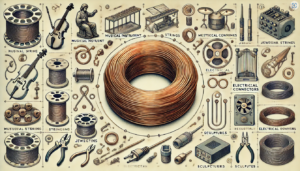What You Need To Know About: Galvanised Steel Wire
This guide on galvanised steel wire is part of our series to outline everything that you need to know about our products. We hope that you find it helpful and that it answers any questions that you may have.
This should answer some questions that you may have.
Let’s jump into it…
What Is It?
Galvanised wire, also known as zinc-coated wire, is a type of wire that has been coated with a layer of zinc to protect it from corrosion. The zinc coating acts as a barrier, preventing moisture and other corrosive elements from reaching the steel wire underneath. This process is known as galvanisation.
Galvanised wire is commonly used in a wide range of applications, including construction, agriculture, and manufacturing. It is commonly used as binding wire in construction, as well as in the manufacture of wire mesh and fencing products. In agriculture, it is used as baling wire and in vineyards, it is used as trellis wire.
Galvanised wire is available in a variety of sizes and thicknesses, with diameters ranging from 0.1 mm to 5 mm. The wire can be round, square, or flat and can be in the form of a solid or stranded wire.
It is relatively inexpensive compared to other types of wire, such as stainless steel or nickel wire. The cost of galvanised wire can vary depending on the size and thickness of the wire, as well as the zinc coating thickness.
Galvanised wire is also used in the production of wire rope, which is a type of cable that is composed of several strands of wire twisted together. Wire rope is used in a wide range of applications, including construction, mining, and transportation.
What Is It Used For?
Galvanised steel wire is a type of wire that is coated with a layer of zinc to protect it from corrosion. The zinc coating acts as a barrier, preventing moisture and other corrosive elements from reaching the steel wire underneath. This process is known as galvanization.
Galvanised steel wire is used in a wide range of applications, including construction, agriculture, and manufacturing. It is commonly used as binding wire in construction, as well as in the manufacture of wire mesh and fencing products. In agriculture, it is used as baling wire, as well as for vineyards trellis wire. Galvanised steel wire is also used in the manufacturing of chain link fencing, which is commonly used for security fencing and enclosures.
Galvanised steel wire is also used in the production of wire rope, which is a type of cable that is composed of several strands of wire twisted together. Wire rope is used in a wide range of applications, including construction, mining, and transportation.
In the manufacturing industry, galvanised steel wire is used as an input in the production of spring, nails, staples, and many other items that are used in construction and other industries.
Galvanised steel wire is also used in the production of art and crafts, such as wire sculpture and jewellery making.
In summary, galvanised steel wire is used in a wide range of applications, including construction, agriculture, manufacturing, and transportation. It is commonly used as binding wire, wire mesh, fencing products, wire rope, and in the manufacturing industry as input for items like spring, nails, and staples. It’s also used in art and crafts like wire sculpture and jewellery making. The zinc coating on galvanised steel wire provides protection against corrosion making it suitable for outdoor and harsh environments.
Is Galvanised Wire Strong?
This process of galvanisation provides several benefits to the steel wire, including increased resistance to corrosion and improved strength. The zinc coating on galvanised steel wire acts as a barrier against the elements, preventing rust and other forms of corrosion from penetrating the steel and weakening it.
Galvanised steel wire is also known for its strength. It is made from high-quality steel that has been specially treated to increase its tensile strength, which is the amount of force required to stretch or bend the wire. This makes it an ideal material for a wide range of applications, including construction, fencing, and other industrial uses where strength and durability are important.
Can It Be Used Outside?
Galvanised steel is a popular choice for outdoor applications because of its excellent resistance to corrosion. The zinc coating on the steel acts as a barrier against the elements, preventing rust and other forms of corrosion from penetrating the steel and weakening it. This makes it an ideal material for outdoor structures such as fences, poles, and buildings.
However, it should be noted that over time, the zinc coating on galvanised steel may degrade due to exposure to environmental factors such as acid rain and salt spray. This can lead to a reduction in its corrosion resistance. Therefore, it is important to regularly inspect and maintain galvanised steel structures in outdoor environments to ensure they continue to provide the desired level of protection. Additionally, it’s important to note that the galvanised steel has a limited lifespan, the zinc coating may degrade over time and the steel will start to rust.
Does Galvanised Steel Rust Easily?
Galvanised steel is less likely to rust compared to uncoated steel because the zinc coating acts as a barrier that protects the steel from the elements. The zinc coating also creates a physical barrier between the steel and the environment, so even if some of the zinc coating is damaged, the steel underneath is less likely to rust. However, over time the zinc coating may degrade due to exposure to environmental factors such as acid rain and salt spray, which can lead to a reduction in its corrosion resistance, and the steel may start to rust. Additionally, if the galvanised steel is scratched or damaged, the zinc coating will be compromised and the steel beneath will be exposed, making it more susceptible to rust. Regular inspection and maintenance of galvanised steel structures can help to prolong their lifespan and reduce the risk of rust.
What Are The Disadvantages Of Galvanised Steel?
Galvanised steel wire has several advantages, including strength and resistance to corrosion, but it also has a few disadvantages that should be considered when deciding whether to use it for a particular application.
One disadvantage of galvanised steel wire is that it can be more expensive than other types of steel wire, due to the additional cost of the zinc coating process. Additionally, the zinc coating can be fragile, and may be damaged or scratched during handling or installation, which can compromise its corrosion resistance and make the wire more susceptible to rust. The coating also has a limited lifespan and will degrade over time, reducing the corrosion resistance of the wire. Another disadvantage of galvanised steel wire is that it may not be suitable for certain applications where the zinc coating may be harmful, such as in food processing or medical equipment.
We think that is pretty much everything that you might need to know about this use for our wire. We offer also a massive range of stainless steel wire and other nickel materials through our store. Choose the wire that you want to work with and we’ll get spooling.
If you’re interesting in learning more about wire, check out our other blog on Everything You Need to Know About Wires.
We are also proud to supply this product on our highly popular eBay store, check us out there too.
Thank you for checking out our site.

DIY Silver Wire for Jewelry Making: Easy Projects to Try at Home
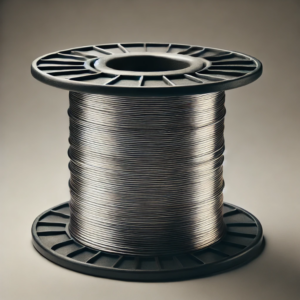
Exploring the Versatility of Sterling Silver Wire
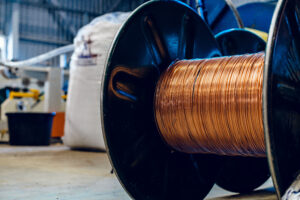
How Tinned Copper Wire Enhances Electrical Conductivity
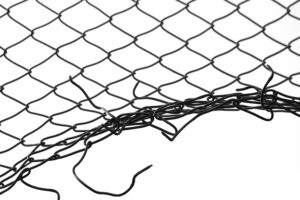
Creative DIY Projects Using Black Wire: Inspiration and Ideas

Unlocking the Secrets of Lockwire: A Comprehensive Overview
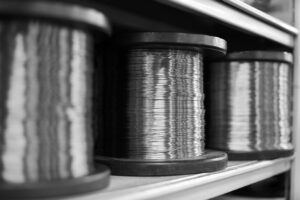
Fine Wire Applications in Modern Technology

The Ultimate Guide to Getting Started with Model Wire
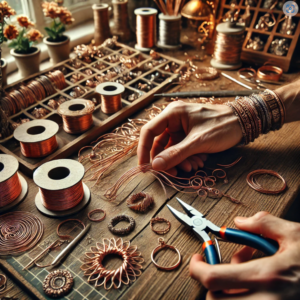
DIY Copper Wire Crafts: Easy Projects for Kids and Adults
